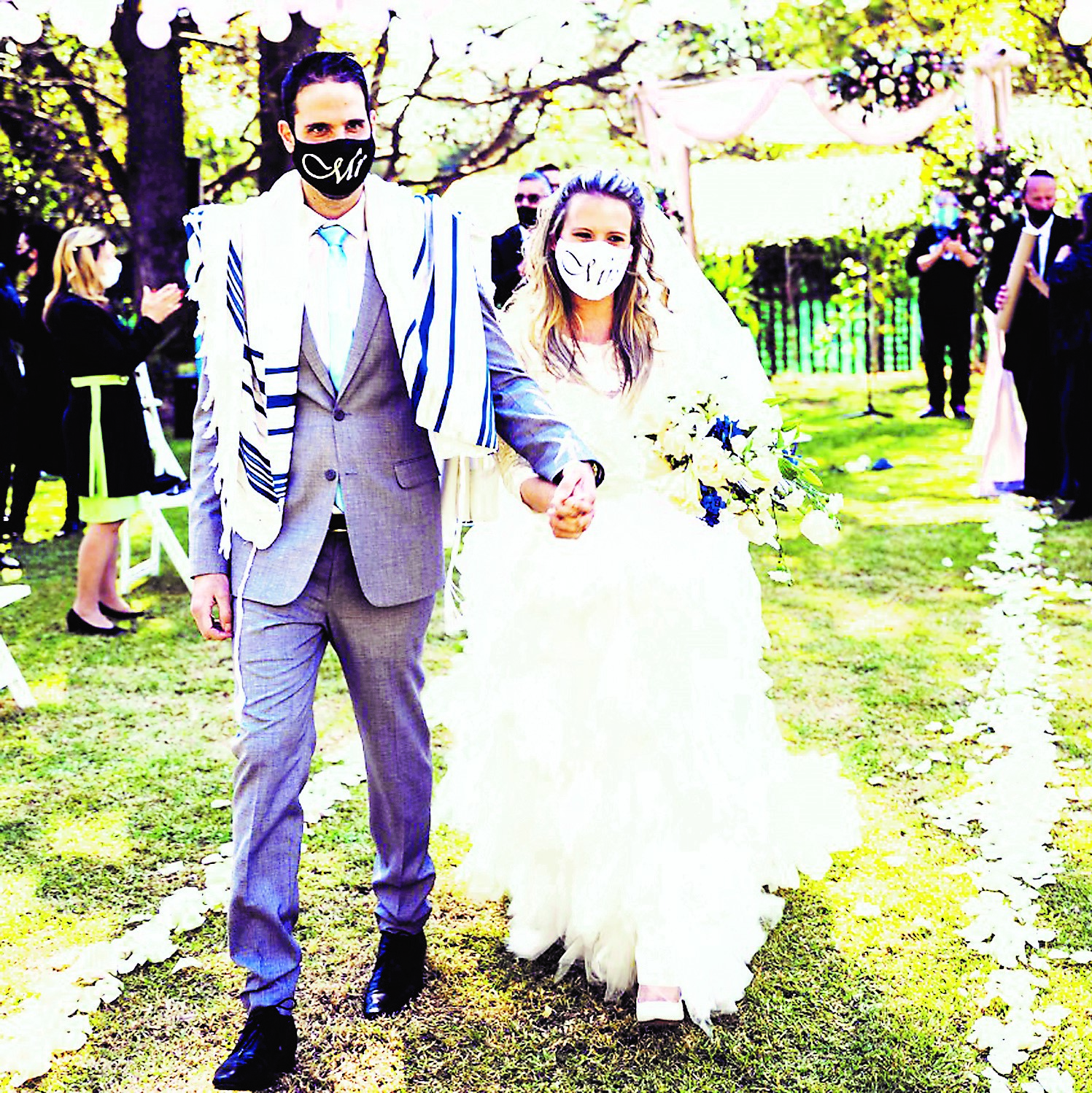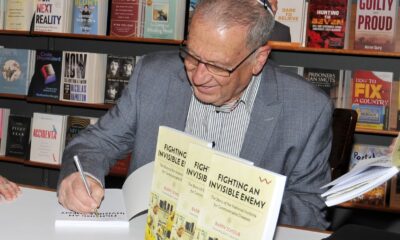
Featured Item

From pomp and ceremony to minimal ‘I do’
When Carryn Bukris envisioned her wedding day, she never imagined she’d be wearing a mask as she walked down the aisle with her husband, Shai.
In spite of severe limitations, however, this determined bride tied the knot in a ceremony which is sure to be remembered for years to come. Watched by masked guests sitting two metres apart, she and her husband got married on 5 July after postponing their wedding by more than a month.
“We were supposed to get married on 31 May at the Hebrew Order of David (HOD),” Bukris told the SA Jewish Report. “We’d planned almost everything, and lockdown prevented us from going ahead.”
“Everyone kept asking us what was happening, and when we’d be getting married. We waited for the chance to go ahead, and it wasn’t easy for us to live under such uncertainty.
“There was nothing we could do about the situation. We just had to wait.”
The onset of the nationwide lockdown in March has forced numerous couples to make hard decisions about their chuppot and wedding celebrations. Whereas some have postponed their simchas, most are opting to go ahead, says Rabbi Gidon Fox, the Beth Din liaison tasked with overseeing the implementation of restrictions on chuppot.
“In general, people have embraced the restrictions. Though not ideal, couples are happy to be able to have the opportunity to get married, which wasn’t the case for a long time from the beginning of lockdown.
“Maintaining protocols at the height of the simcha can sometimes be a challenge, but with correct oversight, management, and prior communication with participants, it’s possible,” Fox says.
The Bukris wedding proved this to be the case. When lockdown restrictions eased towards the end of June, the couple discussed their options with Sydenham’s Rabbi Yehuda Stern, and approached the Beth Din to reschedule their chuppah. Their application was approved, and they were given a new date on which to get married – 10 days later.
“We had ten days to make it all happen,” laughs Bukris. “They let us know on a Thursday that we had the approval, and we just ran with it.
“At a time like this, the ability to reschedule was a gift, and it gave us something we could look forward to. We are all surrounded by so much negativity at the moment. The chance to get our minds focused on something positive for a week was a welcome change from reality.”
Because most of the planning had already been done in advance, the couple called up various service providers who had been booked and advised them of the revised date. The chuppah was relocated to the garden of Sandton Shul, and plans were made to accommodate a smaller gathering of guests with health protocols in place.
“We had to contact people on our guest list to tell them about the changes, and see if it worked for them,” Bukris says. “We decided to have only family and close friends, and unfortunately had to explain to some people that they wouldn’t be able to join us.
“People were very supportive and understanding. We arranged a live stream so that people who weren’t there could be with us. Our guests welcomed the protocols, and there were fortunately no arguments.”
The process involved close consultation with emergency medicine expert Efraim Kramer, whose expertise has been essential to helping the Beth Din ensure the safety of religious gatherings, she says.
“We met Professor Kramer to understand the health guidelines that would ensure that everyone would be safe,” she says. “He worked closely with Rabbi Stern, and guided us on the do’s and don’ts for the day while making sure we still followed halacha at the same time. He also attended to the chuppah itself to make sure that the protocols were followed.”
As per the Beth Din’s directive, that included socially distanced seats (each labelled for use by a single guest only), sanitisation, and temperature check upon arrival, and the wearing of masks by every one of the 50 people in attendance. No food could be served, nor was dancing allowed.
Says Bukris, “It took some getting used to. Naturally, you want to hug and kiss people, and it felt a bit weird not to. But everyone followed the protocols and stayed safe. That was most important to us.”
While the chuppah wasn’t what she would have imagined, the occasion made her and her husband see what truly matters at a wedding.
“We got a chance to understand what a chuppah is really about,” says Bukris. “Because of the situation, you get to see that it’s not about the glitz and glam or a huge party, but about the people.”
The couple has no regrets about the way they chose to celebrate their wedding.
“The whole day was perfect from start to finish,” Bukris says. “We got to celebrate with the people who matter to us, and while we did miss people who couldn’t be there, their safety mattered to us more.”
Chuppot should go ahead as planned where possible, says Fox. “There is a discussion in halacha regarding the propriety of postponing a wedding,” he says. “While there are circumstances when it is allowed, the ideal is for the weddings to go ahead at the planned date and not be postponed. The wedding day is but one day, the marriage on the other hand is for life.
“There’s no question that the wedding isn’t going to mirror their dream wedding. But realisation of the import of the marriage over the import of the wedding is central, and couples opting to go ahead are to be commended and encouraged.”
Says Bukris, “If couples who are planning a wedding have the chance to hold their chuppah, they should definitely go for it. Occasions like this bring back the true meaning of a marriage without all the unnecessary additions which typically surround it.”










